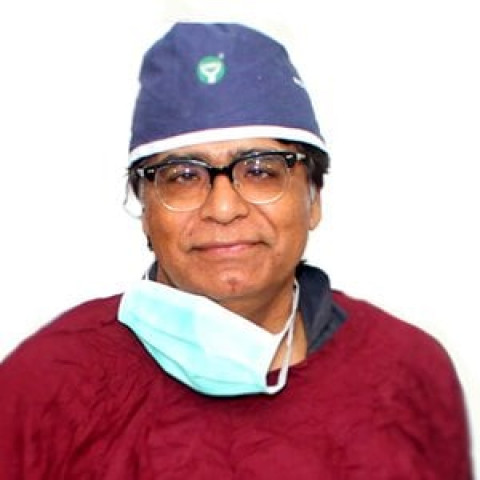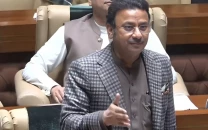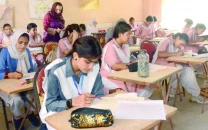Dr Sharif Hashmani - the visionary eye doctor who envisioned a better Pakistan
Having performed over 200,000 surgeries, Dr Hashmani credits all his success to his teachers

The woman, who could not recall her exact age, was suffering from cancer and had been paralysed from the waist down for the last 10 to 12 years. For at least half that time, cataracts had developed in both her eyes, resulting in near-loss of vision.
After examining her, Dr Hashmani suggested surgery. The family, however, was unconvinced, justifying that the woman was old and the surgery would be a waste.
“It took a lot of persuasion to convince the family but they finally came around,” recalls Dr Hashmani. The procedure was quick. No words can do justice to what followed.
When the woman opened her eyes, she grew silent for a few moments, which appeared to stretch into eternity. She then burst out crying, raising her hand and invoking God’s blessings on Dr Hashmani.
It is in this moment, in his 40-year career, that Dr Hashmani felt he had achieved his life’s mission. “I have performed over 200,000 surgeries but I cannot forget that moment when the old lady was blessing me amid tears,” says Dr Hashmani.
Sindh government agrees to doctors’ demands
Building an empire
If you haven’t guessed by now, this is the story of the chairman of Hashmani Hospital and one of the most prominent eye surgeons of Pakistan - Dr Sharif Hashmani.
Born into a middle-class migrant family from Ahmedabad, India, Dr Hashwani’s family had migrated to Karachi at the time of Partition. His father was a goldsmith by profession and struggled to make ends meet at a time of great loss and misery.
As Dr Hashmani and his six brothers came of age, they were given a choice. “My father told us to either put all our energies into our education or start a business,” he recalls. Three of the seven sons, including Dr Hashwani, chose to acquire education.
“You see, education wasn’t only limited to the elite class at the time,” he smiles. Although the schools were lacking in basic facilities, the teachers were sincere with their profession, he says. “We used to sit on mats, but we learned more than what is taught in schools today,” he muses.
Dr Hashmani was enrolled in a Gujarati-medium school in the Old Haji Camp for the first four years of his schooling. Some of Pakistan’s most successful personalities were his classmates - Arif Habib, Aqeel Karim Dedhi and Muhammad Hussain Mehenti, among others. “All of us sat on those mats and rose from there to build successful lives,” he says.
A great teacher inspires
“Education at that time did not suffer from the ills of class system,” says Dr Hashmani. His primary school, despite being Gujarati-medium, gave him a strong base, which helped him throughout his academic career.
Dr Hashmani generally remembers all his teachers fondly. But his greatest inspiration came from Mirza Azeem Baig, who taught mathematics and his physics teacher, Yousuf.
Dr Hashmani credits these two teachers for all his success. He is still in touch with them. Only last month, he and his peers celebrated the 50th anniversary of their graduation from the school, for which the students organised a special ceremony to honour their teachers. Mirza Azeem Baig, who now lives in America, also flew in to attend the ceremony.
From grade five onwards, Dr Hashmani enrolled in an Urdu-medium school, from where he also completed his matriculation.
He passed his matriculation exams with flying colours, standing out among the top 10 students in Karachi. With his grades, he was automatically granted admission to the best college at the time - the Adamjee Science College.
The medium of education here was English, but so strong was Dr Hashmani’s understanding of physics and mathematics by now that he had no difficulty in adjusting. Again, he stood out as one of the top 10 scores in the Intermediate exams.
By this time, one of Dr Hashmani’s elder brothers had qualified as a chemical engineer. Another had started working as a chartered accountant. The elder brothers suggested he go into the field of medicine.
Early on, Dr Hashmani had developed cordial relations with Dr Jamshed Wania - a pioneer in the field of eye care. Dr Wania thus guided Dr Hashmani towards the field of eye diseases. “In fact, I learned the skills of surgery from Dr Jamshed,” he says.
Soon after completing his formal education, Dr Hashmani joined a welfare organisation by the name of Muslim Association and started setting up eye camps in remote areas. This was the year 1979. He hasn’t looked back since.
Dr Hashmani performed his first surgery on a patient he met at an eye camp set up by the Muslim Association at Ranchore Lane. “This was the time when the rate of blindness due to cataract in Sindh was approximately 25%,” he recalled. Now, that figure has considerably decreased, currently standing at 4%, according to his estimates.
Dr Hashmani credits this to improvements in medical technology, rising awareness and free-of-cost treatments being provided by various social welfare organisations.
Personal Life
On the personal front, Dr Hashmani credits his wife for raising his three sons and daughter, and for their successes, both as human beings and in their professional careers. The eldest and youngest sons have followed in their father’s footsteps - the former becoming an eye consultant and the latter an eye specialist. His second son is a chartered accountant and his daughter is a dental surgeon. “I only bore the expenses of my children’s education,” he says. “The responsibility of raising them to be good, successful human beings was borne by their mother.”
From a very early age after his marriage in 1981, Dr Hashmani devised a formula to divvy up his time between his professional and personal commitments. The weekdays were reserved for his patients. Saturdays, he kept for himself and would travel to his farmhouse on the outskirts of Karachi to be with nature. He entertained close friends at the farmhouse but would not involve himself in professional matters.
Come Sunday, Dr Hashmani would devote himself to the family, spending time with his wife and children.
Professional development
For Dr Hashmani, revolutionary changes are occurring in the field of medicine, especially in the branch of eye care, since the past three decades. “It is absolutely vital to keep abreast of these changing norms by studying medical journals and constantly updating your knowledge base,” he says.
Dr Hashmani, now 67 years old, only has medical journals around him in his room. He complements his reading with ghazals playing in the background. Mehdi Hassan is his favourite. “I also had the honour to operate on both eyes of Mehdi Hassan,” he says proudly.
But Dr Hashmani is apprehensive about the lack of research facilities in Pakistan. “Research is nearly absent in Pakistan,” he laments. “On the other hand, Indian research papers are published in international research journals on a regular basis,” he says. This why he hopes to see more medical research in Pakistan.
It is this desire that has led him to set up the Pakistan Research Initiative. The PRI will promote research in Pakistan, in association with international universities. For now, a research project is in the works to determine the causes of blindness among the elderly population in Pakistan. “This project will strive to ascertain the genetic causes and reasons for age-related muscular degeneration, so that the transfer of such diseases can be stopped in the younger generation,” he explains.
Dr Hashmani also believes that setting up eye camps in remote areas is no longer a necessity. What is, however, needed are permanent hospitals where patients can also get follow-up treatment. He is ready to assist the provincial government in this regard.
Currently, there are six Hashmani centers in Karachi and one in Thatta. The centers in Thatta, North Karachi and Ranchore Lane provide free-of-cost eye treatment, including surgery. Around 500 to 600 patients visit these seven centers every day.
OPDs to open today as doctors call off strike
International recognition
The Hashmani Hospital has published 22 research papers in international journals.
Dr Hashmani himself has been awarded gold medals twice for his exemplary role in the elimination of eye diseases in Pakistan by the Asia Pacific Academy of Ophthalmology.
He has also led the way to the introduction of a new cataract surgery technique in Pakistan. Besides, he has propagated this technique in Bangladesh and Sri Lanka and provided training to experts in those countries.
Moreover, specialists from America, England, Bangladesh and other South Asian countries visit Pakistan to learn surgery techniques and get trained by Dr Hashmani. Around 30 foreign eye specialists have acquired training from the Hashmani Hospital to date.
A humble man
And yet, Dr Hashmani’s single-greatest accomplishment was being able to restore the vision of the old lady in Mardan. “She didn’t know Urdu and I couldn’t understand Pashto, but her invocation of blessings moved me greatly,” he reminisces.
This is what Dr Hashmani works for. He still visits the camp site each year and has made it a point to visit her home on every visit. “After her eyesight was restored, her position in the family improved,” he says. She is no longer bed-bound and spends most of her day in a wheelchair. “The spark returned to her eyes and her life,” he says proudly.



















COMMENTS
Comments are moderated and generally will be posted if they are on-topic and not abusive.
For more information, please see our Comments FAQ